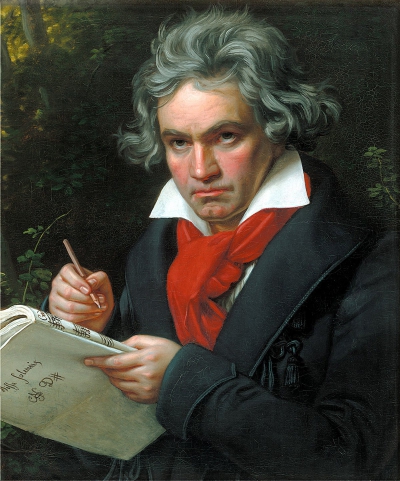The Piano Concerto No. 5 in E-flat major, Op. 73, known as the Emperor Concerto in English-speaking countries, is a concerto composed by Ludwig van Beethoven for piano and orchestra. Beethoven composed the concerto in 1809 under salary in Vienna, and he dedicated it to Archduke Rudolf, who was his patron, friend, and pupil. Its public premiere was on 28 November 1811 in Leipzig, with Friedrich Schneider as the soloist and Johann Philipp Christian Schulz conducting the Gewandhaus Orchestra. Beethoven, usually the soloist, could not perform due to declining hearing.
The work's military aspects and symbolism characterize its heroic style. Beethoven used novel approaches with the piece, such as beginning the solo entrance without orchestral introduction, lengthening the concerto, and creating a new relationship between piano and orchestra. The first of its three movements, Allegro, is in sonata form and is longer than any opening movement of Beethoven's earlier piano concertos. The second movement, Adagio un poco mosso, is a nocturne that directly builds into the third movement. The last movement, Rondo: Allegro ma non troppo, is in seven-part rondo form. The concerto is approximately forty minutes.
The origin of the epithet Emperor is uncertain; it may have been coined by Johann Baptist Cramer, the English publisher of the concerto. The concerto has no association with any emperor, and according to Donald Tovey and Betsy Schwarm, Beethoven would have disliked it due to his disapproval of Napoleon's conquest. As part of his repertoire, Franz Liszt frequently performed the concerto throughout his life. Since 1912, it has been recorded numerous times by classical pianists.
Ludwig van Beethoven ( (listen), German: [ˈluːtvɪç fan ˈbeːtˌhoːfn̩] (listen); baptised 17 December 1770 – 26 March 1827) was a German composer and pianist. Beethoven remains one of the most admired composers in the history of Western music; his works rank amongst the most performed of the classical music repertoire and span the transition from the Classical period to the Romantic era in classical music. His career has conventionally been divided into early, middle, and late periods. His early period, during which he forged his craft, is typically considered to have lasted until 1802. From 1802 to around 1812, his middle period showed an individual development from the styles of Joseph Haydn and Wolfgang Amadeus Mozart, and is sometimes characterized as heroic. During this time, he began to suffer increasingly from deafness. In his late period, from 1812 to 1827, he extended his innovations in musical form and expression.
Beethoven was born in Bonn. His musical talent was obvious at an early age. He was initially harshly and intensively taught by his father Johann van Beethoven. Beethoven was later taught by the composer and conductor Christian Gottlob Neefe, under whose tutelage he published his first work, a set of keyboard variations, in 1783. He found relief from a dysfunctional home life with the family of Helene von Breuning, whose children he loved, befriended, and taught piano. At age 21, he moved to Vienna, which subsequently became his base, and studied composition with Haydn. Beethoven then gained a reputation as a virtuoso pianist, and he was soon patronized by Karl Alois, Prince Lichnowsky for compositions, which resulted in his three Opus 1 piano trios (the earliest works to which he accorded an opus number) in 1795.
His first major orchestral work, the First Symphony, premiered in 1800, and his first set of string quartets was published in 1801. Despite his hearing deteriorating during this period, he continued to conduct, premiering his Third and Fifth Symphonies in 1804 and 1808, respectively. His Violin Concerto appeared in 1806. His last piano concerto (No. 5, Op. 73, known as the Emperor), dedicated to his frequent patron Archduke Rudolf of Austria, was premiered in 1811, without Beethoven as soloist. He was almost completely deaf by 1814, and he then gave up performing and appearing in public. He described his problems with health and his unfulfilled personal life in two letters, his Heiligenstadt Testament (1802) to his brothers and his unsent love letter to an unknown "Immortal Beloved" (1812).
After 1810, increasingly less socially involved, Beethoven composed many of his most admired works, including later symphonies, mature chamber music and the late piano sonatas. His only opera, Fidelio, first performed in 1805, was revised to its final version in 1814. He composed Missa solemnis between 1819 and 1823 and his final Symphony, No. 9, one of the first examples of a choral symphony, between 1822 and 1824. Written in his last years, his late string quartets, including the Grosse Fuge, of 1825–1826 are among his final achievements. After some months of bedridden illness, he died in 1827. Beethoven's works remain mainstays of the classical music repertoire.

1811Nov, 28
Beethoven's Piano Concerto No. 5 in E-flat major, Op. 73, premieres at the Gewandhaus in Leipzig.
Choose Another Date
Events on 1811
- 5Mar
Battle of Barrosa
Peninsular War: A French force under the command of Marshal Victor is routed while trying to prevent an Anglo-Spanish-Portuguese army from lifting the Siege of Cádiz in the Battle of Barrosa. - 5May
Battle of Fuentes de Oñoro
In the second day of fighting at the Peninsular War Battle of Fuentes de Oñoro the French army, under Marshall André Masséna, drive in the Duke of Wellington's overextended right flank, but French frontal assaults fail to take the town of Fuentes de Oñoro and the Anglo-Portuguese army holds the field at the end of the day. - 16May
Battle of Albuera
Peninsular War: The allies Spain, Portugal and United Kingdom, defeat the French at the Battle of Albuera. - 7Nov
Battle of Tippecanoe
Tecumseh's War: The Battle of Tippecanoe is fought near present-day Battle Ground, Indiana, United States. - 28Nov
Piano Concerto No. 5 (Beethoven)
Beethoven's Piano Concerto No. 5 in E-flat major, Op. 73, premieres at the Gewandhaus in Leipzig.

 English
English  español
español  français
français  português
português  русский
русский  العربية
العربية  简体中文
简体中文 